Showing 901–910 of 1165 results

This volume is an endeavour to present the major ecological concepts and processes which may help in refashioning the framework of sociology. It is also an attempt to deal with a comparative social ecology on which rest the foundations of comparative economics and sociology.
This book of Radhakamal Mukerjee, with an introduction of Klaus Seeland, is an authoritative study on social ecology. Social ecology is different in scope from human ecology. Since there is whole gamut of confusion about the term social ecology and its relation with sociology, here is an attempt to detail the essential principles of social ecology and its scientific fruitfulness for sociology.
This volume is an endeavour to present the major ecological concepts and processes which may help in refashioning the framework of sociology. It is also an attempt to deal with a comparative social ecology on which rest the foundations of comparative economics and sociology. Social ecology studies the place, occupation and time relations of persons and groups in their processes of competition, co-operation, conflict, accommodation and succession. It is a vast and virgin field orienting social phenomena on the basis of the give-and-take between life, mind and region.
This book is so comprehensive that it should contribute to a scientific classification of socialecological concepts and to the development of a methodology according to which social economy may form the basis of a new functional and quantitative sociology. Therefore, it should be a referral book for sociology students, teachers and researchers.
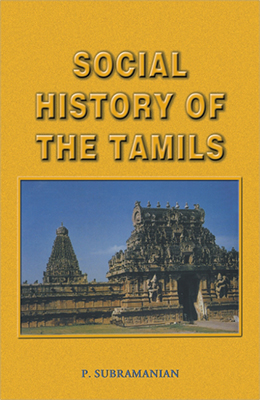
The book offers an account of the Tamils society, economy, religious beliefs, educational mechanisms, arts and cultural expressions (during 1707-1947). It also discusses the profound influence of colonial rule in the tradition-bound Tamilian society.
Notwithstanding the prolificity of indepth researches in contemporary historiography, Professor Subramanian’s book is the first concentrative effort to track down the social history of the Tamils. Today, the Tamils, over fifty million of them, live in the south-eastern state of the Indian peninsula: Tamil Nadu — which indisputably represents the very nucleus of millennia-old Dravidian culture in India. The book offers a compelling account of the Tamils’ society, economy, religious beliefs, educational mechanisms, arts, and cultural expressions during the years 1707-1947 — when, significantly, the British domination blossomed, bloomed, and faded; when new thoughts, new ideas, and new ways of life came as irresistibly into the homeland of the Tamils as into the Indian subcontinent. Thus retracing over two centuries of the ‘British connextion with India’, the author here tries to show how the long colonial rule in India exposed the tradition-bound Tamilian society to Western influences — with results that proved incalculable in both their range and depth. Social History of the Tamils : 1707-1947 is the outcome of Professor Subramanian’s decade-long, painstaking research, authenticated by an astonishing mass of evidence including archival records, Jesuit sources, Modi (Maratha) manuscripts, newspapers’ reports, biographies, travelogues, literary writings, and even fictional works.

The book offers an account of the Tamils society, economy, religious beliefs, educational mechanisms, arts and cultural expressions (during 1707-1947). It also discusses the profound influence of colonial rule in the tradition-bound Tamilian society.
Notwithstanding the prolificity of indepth researches in contemporary historiography, Professor Subramanian’s book is the first concentrative effort to track down the social history of the Tamils. Today, the Tamils, over fifty million of them, live in the south-eastern state of the Indian peninsula: Tamil Nadu — which indisputably represents the very nucleus of millennia-old Dravidian culture in India. The book offers a compelling account of the Tamils’ society, economy, religious beliefs, educational mechanisms, arts, and cultural expressions during the years 1707-1947 — when, significantly, the British domination blossomed, bloomed, and faded; when new thoughts, new ideas, and new ways of life came as irresistibly into the homeland of the Tamils as into the Indian subcontinent. Thus retracing over two centuries of the ‘British connextion with India’, the author here tries to show how the long colonial rule in India exposed the tradition-bound Tamilian society to Western influences — with results that proved incalculable in both their range and depth. Social History of the Tamils : 1707-1947 is the outcome of Professor Subramanian’s decade-long, painstaking research, authenticated by an astonishing mass of evidence including archival records, Jesuit sources, Modi (Maratha) manuscripts, newspapers’ reports, biographies, travelogues, literary writings, and even fictional works.
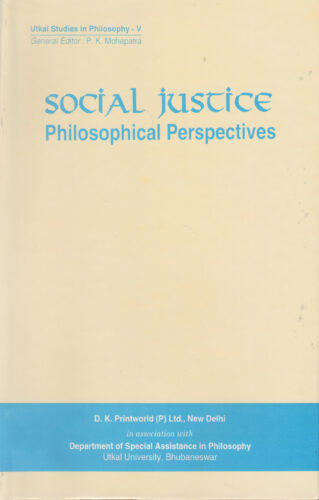
These essays look afresh at the varying connotations of Social Justice in its moral, legal, economic, political and historic perspectives. They consider social justice vis-a-vis democracy, gender questions, justice-making mechanisms, retribution and the Hindu Karma.
Civilisational history, in a way, has been mans unending quest for social justice, leading him to strive not only for equality, but also for the abolition of discriminations in every form. Social justice, however, has defied a precise definition. And, as a concept, has been viewed differently in different contexts dependent, as it has been, on the contigencies of time, place and person. Here is a multi-author work trying to sharpen the readers understanding of social justice against the backdrop of its diverse concepts across the ages. An assemblage of 15 insightful essays, each written by a reputed scholar, the book looks afresh at the varying connotations of Social Justice, in all its essential perspectives: moral, legal, economic, political and historical. Attempting, thus, to visualise its concept, the authors consider social justice vis-a-vis democracy, gender questions, justice-making mechanisms, retribution, and even the Hindu doctrine of karma. Of special interest to readers is the analysis, by some authors, of the Indian experiments of social justice in extending preferential treatment to members of the exploited classes and evaluate its impact on the Indian society in general and on the preferred classes in particular. Volume 5 in the Utkal Studies in Philosophy series, this collection is an important contribution not just to the ever-continuing dialogue on social justice, but to Analytical Philosophy of Values as well. Social thinkers/activities, sociologists, social scientists, and, more specially, the scholars of philosophy will find it a useful acquisition.
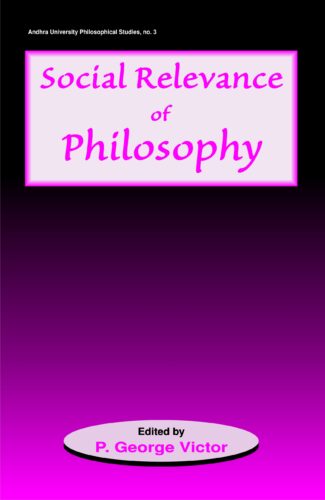
The essays study the relevance of philosophy at the social level, examining various philosophical systems. Considering the views of Indian and western thinkers including Thiruvalluvar and Gandhi, they take up contemporary concerns like dalit philosophy, philosophical counseling and tackling effects of consumerism.
What is the role of philosopher? Can philosophy be of any use to mans social living? These are some of the questions that the philosophy teachers try to answer in this book of twenty-two essays. It closely scrutinises the relevance of philosophy at the social level, throwing light on various philosophical systems and view of thinkers, both Indian and western. It shows how people can be guided on their many problems in a philosophical and holistic manner. Presented at a national seminar, the essays discuss a wide range of philosophical issues and perspectives on how man can modify his individual thinking, develop the spiritual dimension of life, transform his social conduct and manage personal and social relationships better. They deal with the relevance of Gandhis concept of freedom, the ethical importance of Tiruvalluvars philosophical outpourings, Buddhist perspectives on mindfulness and social reformation, and significance of Yoga for harmonious living. They take up contemporary concerns like reservations, dalit philosophy, growth of philosophical Counselling, ethical and bio-ethical dimensions of abortion, professional ethics, and role of philosophy in tackling the harmful effects of consumerism and materialism. This book will be extremely interesting for scholars of philosophy as well as general readers, and highly useful as a textbook in Applied Philosophy for students.

The book unveils the ancient Indian society in all its variegated evolutionary expressions across 2500 years to explore the sociological orientations of the Vedic Samhitas, Brahmanas, Upanisads and other Sanskrit works besides Buddhist and Jaina works.
It is a fascinating, meticulously documented study unveiling, for the first time, the ancient Indian society in all its variegated evolutionary expressions across about two-and-a-half millennia: since the Vedic times (c. 1500 BC) with a beautifully well-knit account of its religions and cultic practices; economic paradigms; polity and statecraft; educational set-up; customes, manners, etiquettes; food habits, drinks, dress styles; sports, pastimes, modes of recreations; sex life and sexual morality; casteist hierarchies; attitude towards women; and its crimes, punishments and legal codes. Epitomising a lifetime of Dr. Banerjis research on ancient India, the book vividly captures all different articulations of sociological import from a whole body of traditional writings: both sacred and secular. Again, it turns out to be the first ever study to singly explore the sociological orientations of the Vedic Samhitas, Brahmanas, Upanishads, Kalpasutras, Vyakaranas, Puranas, Smritishastras, Tantric texts, the Ramayana, the Mahabharata, Kautilyas Arthashastra, and many other Sanskrit classics besides Buddhist and Jaina works in Pali, Prakrit and Apabhramsha languages. With highly informative appendices, extensive bibliographic references and a glossary of technical/unfamiliar words, the book holds out enduring appeal to both scholars and discerning readers.
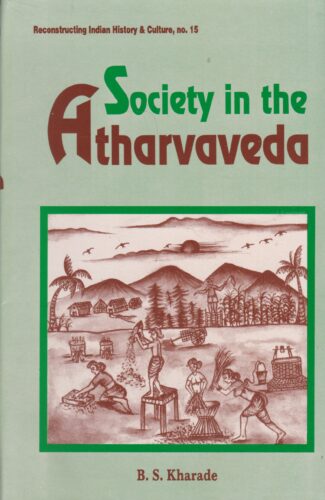
The Atharvaveda delineates the life of the common man in ancient Indian village community. The book focuses on farming and cattle breeding, crafts, religion, daily preoccupations and fashions, role of women and their problems, etc.
Of the Vedas the Atharvaveda, the Veda of the masses, is unique. Unlike the Rig, Sama and Yajur Vedas, the Atharvaveda delineates the life of the common man in the ancient Indian village community the village farmer, craftsman and others who formed the core of the agriculturist society of the time. Modern scholarship has focused much on the vedatrayi but little has been written on the Atharvaveda. Society in the Atharvaveda not only attempts to address the dearth of scholarly studies on the Atharvaveda but it is also perhaps, in recent years, the first ever study of the Atharvaveda from the point of view of the common people. The Atharvavedic verses throw light upon a wide range of themes and all these are discussed here: topics from farming and cattle breeding, village crafts, religion, daily preoccupations and fashions of the people, role of women and their problems in day-to-day life, crime and degenerative practices like adultery and gambling, to trade and travel means and routes, loan facility, taxation, political administration and mans response to his environment. The author traces this Veda as the source of many traditional folk songs that are sung even today by the common man at work in the villages. This systematic survey dispels the widespread notion that the Atharvaveda is subordinate to the vedatrayi; rather the author shows that it occupies an unrivalled importance in Vedic literature largely owing to its preoccupation with the life of the people at large. The book abounds with Atharvavedic verses; a number of verses are cited to bring out each and every aspect of common life and living. With meaningful appendices, this scholarly work would provide interesting and useful research and reference material to Vedic scholars especially those keen on studying the Veda of the masses in a fresh perspective.
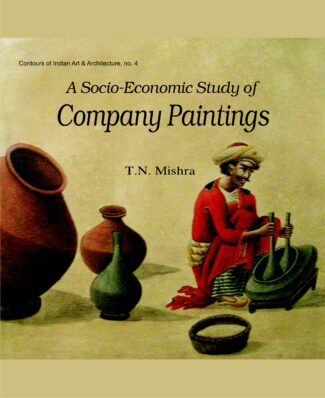
This book describes the social and economic condition of India as shown in the Company paintings during the British rule. It also sheds light on the techniques adopted by the artists in depicting the various themes in paintings.
The paintings of the eighteenth and nineteenth centuries are recognised as a valuable source for the study of social and economic life during the colonial period. A deep study of the Company paintings of the time is significant because the paintings have carefully observed and recorded the Indian scene in all its aspects, particularly its history and society.
The book discusses the evolution of the Company School of Art, as a result of interactions between traditional Indian paintings and European paintings, and its spread to most of the art centres in India. In a thorough attempt, it deals with its thematic preoccupations and the common features of the paintings: their favourite subjects, especially their depiction of the professions, and the variety of common people they carefully depict. It examines the techniques adopted by the artists: their choice of mediums and colours and their style of depicting the themes. It also takes up the social status of the artists at the time.
The book will fascinate lovers of Indian art and will prove useful to scholars and students especially involved in study of evolution of Indian art and modern art.
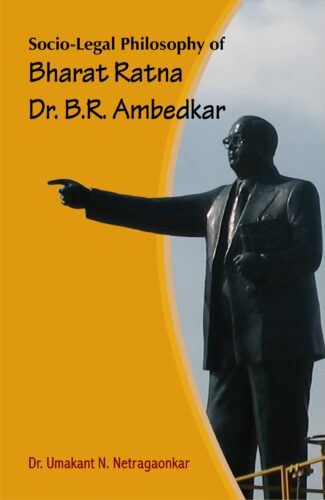
An in-depth study of Dr Babasaheb Ambedkar’s life, his social and economic philosophy, contribution to social justice, his struggle for rights of weaker sections in society, and his thoughts on the legal system of India, particularly human rights and equality of all peoples.
An in-depth study of the thoughts of Babasaheb Ambedkar on the social, economic and legal system of India, this book examines the relevance of Ambedkars thoughts today when societies have disparities and are going through conflicts. It deals with aspects of Ambedkars life, his social and economic philosophy, contribution to social justice, and his struggle for rights of weaker sections in society.
The volume deals with the social condition and political rule in the pre-Buddhist era and later till the sixth century ce, the origin and flourishing of the caste system in ancient times, and untouchability. It explores the meaning of some basic terms like justice. It views the Constitutional provisions regarding ensuring equality of all peoples and abolition of untouchability and explains how Ambedkar helped to establish the Constitutional rights of the SCs and the STs and the backward classes. A special focus is on the reservation issues and the judicial stand on them. It showcases the Supreme Court of Indias reinterpretation of Ambedkars vision and philosophy of social justice in its decisions concerning reservation. It throws light on the new concept of social justice that the judiciary has emphasized over the decades with stress on positive human rights.
The Socio-Literary and Cultural Study of Indian Society from Ancient to Modern is a search for India’s heritage: Hindu, Sufi and about Nationalism and India’s freedom from her colonial past. It is analytical but not learnedness. The author believes as Iqbal, the famous Urdu poet, said: “Transcend your reason because though it is a glow, it is not your destination; it can only be the path to the destination show.” People, both Indian and foreign, who want to understand Indian heritage from Ancient to Modern in a simple, agreeable style and friendly manner, is the author’s destination. In this volume, he has tried to demolish many myths like dharma is religion, Vedas are Śruti though the Almighty ordered six ṛṣis to write them down. A Hindu is just not emotional in mind, he also believes in analytic discussion (tarka). Upaniṣads are not just created by ṛṣis but also by a revolution unfolded by the students by barraging questions after questions.By explaining about the vitality of India and many other subjects, the book elucidates many things about the idea of India in an authentic manner. The readers will find here many varieties of theological explication, ultimately leading to the celebration of life while searching for the divine and realizing the self.
| There are no products |